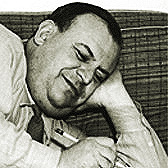
Prolific songwriter wrote over 500 songs from 20s to 40s
Jimmy McHugh
InducteeWrote "I'm In The Mood For Love" and "On The Sunny Side of the Street"
Jimmy McHugh's most popular songs have an infectiously swinging quality that instantly endears them to the listener. He was born James Francis McHugh in Boston, Massachusetts on. July 10, 1894. His father ran a plumbing business and his first piano lessons came from his mother. He attended St. John's Preparatory School and then Holy Cross College, where be studied music.
His first job in music was as a rehearsal pianist at the Boston Opera House and soon popular music beckoned. He began working as a song plugger for the Boston office of Irving Berlin's publishing company and in 1921, he moved to New York, where he began writing songs, especially for the Cotton Club revues in Harlem. In 1924 be had a success with one of his Cotton Club songs, "When My Sugar Walks Down the Street" (lyric by Gene Austin, with credit given to publisher Irving Mills). Another success from his Cotton Club years was "I Can't Believe That You're In Love With Me" (lyric by Clarence Gaskell).
In 1927 one of McHugh’s most important professional relationships began when he met lyricist Dorothy Fields. They began writing together and in 1928 they had a there first big hit with the enduringly popular "I Can't Give You Anything But Love, Baby", written far the all-black Broadway revue Blackbirds of 1928. Other songs written by them for this show were "Digga Digga Do" and "I Must Have That Man".
In 1930 they wrote another favorite, "On the Sunny Side of the Street", for Lew Leslie's International Revue. For the same show, they wrote "Exactly Like You". Also in 1930, this time for The Vanderbilt Revue, they wrote "Blue Again". For a 1932 Chicago Revue called Clowns in Clover, Fields and McHugh wrote "Don't Blame Me".
The team then moved to Hollywood where they worked on the films Love in the (1930), Singin' the Blues (1931), Cuban Love Song (193 1), Dinner at Eight (1933) and Clowns in Clover (1933). For the 1935 film Every Night at Eight, they wrote "I Feel a Song Comin' On" and "I'm In the Mood For Love".
Following the success of the 1935 films, McHugh and Fields co-wrote a new lyric based on an existing Oscar Hammerstein lyric for Jerome Kern's "I Won't Dance". In the years that followed, Fields would work primarily with Kern, and McHugh found a new primary lyricist to colloborate with: Harold Adamson. For the 1937 film Top of the Town, McHugh and Adamson wrote "Where Are You?" and then in 1937, they wrote the title song for a film called “You're A Sweetheart”.
In 1940, for a Jack Benny film called Buck Benny Rides Again, McHugh wrote "Say It (Over And Over Again)", with words by Frank Loesser. And in 1942, the Loesser-McHugh colloboration created "Can't Get Out Of This Mood", included in the film Seven Days' Leave.
During World War II, McHugh and Adamson again collaborated on several patriotic songs, including 1943's "Coming In On a Wing and a Prayer". For their war work, Harry Truman awarded them a Presidential Certificate of Merit. And then in 1948 for the film called A Date with Judy, McHugh and Adamson wrote "It's A Most Unusual Day", which has been one of the most successful standards from Tin Pan Alley.
Outside of songwriting and composing, in 1951 McHugh founded the Jimmy McHugh Polio Foundation, which became Jimmy McHugh Charities. Additionally, he was a member of the Board of Directors of the Beverly Hills Chamber of Commerce, serving from 1950 to 1952 as its president, and from 1960 until his death he was a Director of ASCAP. Jimmy McHugh died in Beverly Hills, California on May 22, 1969.







